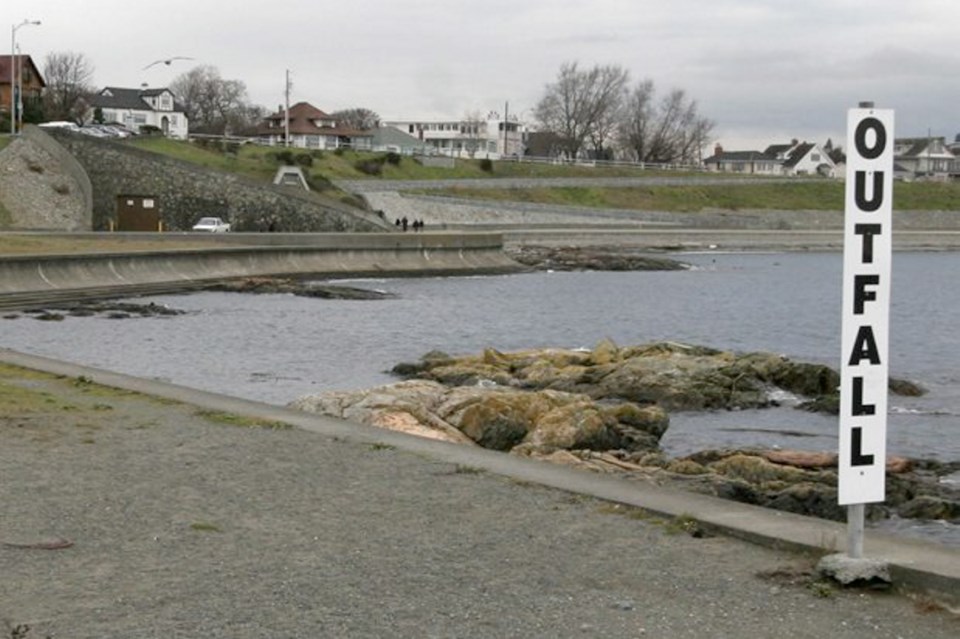A panel of experts is on track to have a business case for sewage treatment completed by the Sept. 30 deadline, Capital Regional District directors were told Wednesday.
The new panel, called the Core Area Waste Water Treatment Project Board, has met three times since it was appointed in May, lawyer Jane Bird, the panel’s chairwoman, told CRD directors Wednesday. It expects to provide a business case for the recommended sewage option to the CRD board by mid-September.
The board is in the process of reviewing, assessing and rating all treatment options and sites, including all public input gathered to date, Bird said in her first update to the board.
“We really are up to our ears at the moment and we’re just working our way through all of the work to be able to come up with the most robust conclusion that we can for you in a few weeks’ time,” Bird said.
The results of this assessment process will form the basis of recommendations and the business case, she said.
“It’s a question of reviewing all the material — understanding what the issues are, both technical and otherwise,” Bird said in an interview.
“We’ve been able to have access not just to the technical stuff but to the commentary that people have put forth over that period, and I’m really mindful that there has been a lot of dialogue and conversation whether it be formally at zoning hearings or in open houses,” she said.
“Reading through that gives you a good sense of what the community thinks the issues are and that helps enormously in terms of trying to frame what we’re trying to achieve here.”
Bird told CRD directors her board will establish a due-diligence panel that will be asked to provide a report on the board’s work. It will likely be composed of three individuals with experience on development and delivery of large projects and waste-water treatment, she said.
The report will include a review of the range of alternative options, the assessment process and outcome and an opinion on whether it was properly conducted and reasonable.
Saanich director Vic Derman said to ensure independence, it should be the CRD board, not the project board, selecting the due-diligence panel. At the very least, he said, the CRD should have a veto over the panel’s membership.
“We have, I think, both a moral duty and a fiduciary duty to be able to review what you bring forward as a business case and determine whether that meets the goals of this board,” Derman said.
Bird said “it would seem sensible” that both her board and the CRD should feel comfortable with the composition and qualifications of due-diligence panel’s membership.
“I expect that we would both have the same concerns with respect to independence, with respect to ability and with respect to the terms of reference with that board,” she said, adding she would be happy to work with the CRD on the panel’s composition and terms of reference.
CRD chairwoman Barb Desjardins reminded directors that the project board’s work is “a joint effort” with the CRD.
“This project board is considered something under CRD and so part of CRD and it can be an ‘us versus them’ situation. We have to move forward.”
This was the first update provided by Bird since CRD directors — after a decade of trying without success to come up with a plan for sewage treatment for Greater Victoria — reluctantly bowed to pressure from the province and ceded control of the core area’s sewage-treatment program to the project board.
The CRD got close to getting shovels in the ground two years ago with a proposed single regional plant at the site of a former tank farm at Esquimalt’s McLoughlin Point.
That plan, with an estimated price tag of $788 million, was abandoned because Esquimalt would not approve minor zoning variances for the McLoughlin site, and the province refused to override the decision.
That started a new round of technical and environmental studies, public consultation and site examinations that seemed to point to Victoria’s Rock Bay as the preferred site for a regional plant.
At the last minute, CRD directors shifted course and decided to test the public’s appetite for building two sewage-treatment plants: one to be buried under a park at Clover Point in Victoria and the other at either McLoughlin Point or Macaulay Plain in Esquimalt at an estimated cost of $1.13 billion.
That’s when B.C. Community Minister Peter Fassbender stepped in, essentially telling the local politicians to agree to the new panel or risk losing more than $500 million in federal and provincial money this fall.



